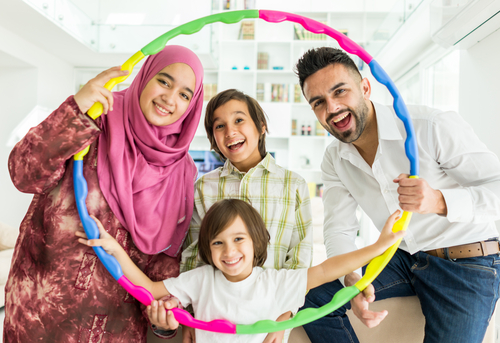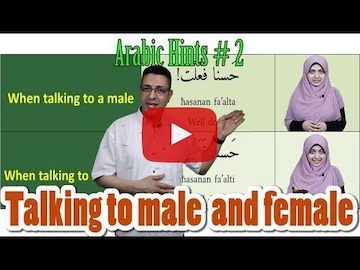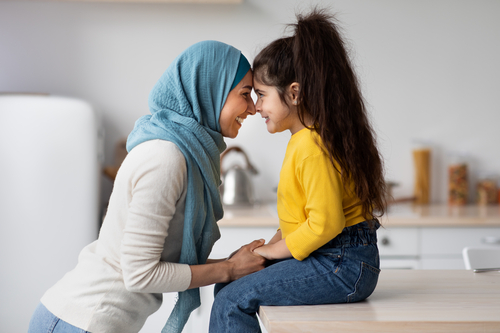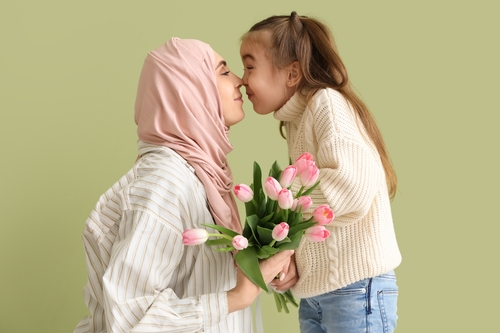The most full-hearted ways to say I love you in Arabic

One of the most crucial roles of language is conveying feelings. Due to the fact that Arabic is one of the most expressive languages in the world, it provides an abundance of synonyms for a variety of emotions, particularly those associated with love. Let's start with the simplest way of saying "I love you" in Arabic.
أُحِبُّك!
/`uħibbuk/
I love you!
Linguistic Background:
- In light of the fact that the verb (أحِبُّ) /`uħibbu/ (I love) contains the latent/hidden pronoun أنَا /`anā/ (I), it is unnecessary, from the standpoint of modern standard Arabic, to say (أنَا أُحِبُّك) /`anā `uħibbuk/. But occasionally, it could be necessary for emphasis.
- Linguistically speaking, it is also extremely frequent to refer to a neutral addressee (you, masculine or feminine) by pronouncing the ك /k/ (you) with Sukūn (pause, no vowel). In general, you can use أُحِبُّكَ /`uħibbuka/ to address the speech to a male, and أُحِبُّكِ /`uħibbuki/ to address the speech to a female. However, the most widely used way to say "I love you" in Arabic is simply /`uħibbuk/ without the /a/ or /i/ ending.
Watch this video for additional details on gender-neutral language usage in Arabic:
Gender-neutral way in Arabic

How to address Arabic speech to any gender (feminine or masculine) by removing the final sign ending of the Arabic pronoun
However, this post delves into the most commonly used heartfelt expressions that go beyond the ordinary phrase "I love you!". Whether you want to show appreciation to your family, express adoration for your children, or shower your partner with affection, these Arabic phrases will help you convey your love in a way that truly resonates.
Get ready to add some depth and richness to your way of saying "I love you" in Arabic!
Let's begin with the love that matters most in a person's heart:
Allah (SWT) الله سُبحَانه وتَعَالى

أُحِبُّ الله خَالِقي
/`uħibbu llâha khâliqī/
I love Allah, my Creator!
Meaning:
Muslims, or rather all humanity, should love their Creator above all others. From the Qur'an, Allah (SWT) says:
وَمِنَ النَّاسِ مَن يَتَّخِذُ مِن دُونِ اللَّهِ أَندَادًا يُحِبُّونَهُمْ كَحُبِّ اللَّهِ ۖ وَالَّذِينَ آمَنُوا أَشَدُّ حُبًّا لِّلَّه... [البقرة: 165]
(2:165) Still there are some who take others as Allah’s equal—they love them as they should love Allah—but the believers love Allah even more…
Furthermore, Islam states that love for Allah and His Messenger (PBUH) ought to outweigh love for one's spouse, parents, kids, and other relatives. The Messenger (PBUH) added these words:
لَا يُؤْمِنُ أَحَدُكُمْ حَتَّى أَكُونَ أَحَبَّ إِلَيْهِ مِنْ وَالِدِهِ، وَوَلَدِهِ، وَالنَّاسِ أَجْمَعِينَ
None of you believes till I am dearer to him than his father, his children, and all mankind.
Moreover, love in this life ought to be grounded in Islam; that is, the one being loved ought to be a believer and virtuous, and vice versa. The messenger (PBUH) said.
ثَلَاثٌ مَنْ كُنَّ فِيهِ وَجَدَ بِهِنَّ حَلَاوَةَ الْإِيمَانِ: أَنْ يَكُونَ اللهُ وَرَسُولُهُ أَحَبَّ إِلَيْهِ مِمَّا سِوَاهُمَا، وَأَنْ يُحِبَّ الْمَرْءَ لَا يُحِبُّهُ إِلَّا لِلَّهِ...
There are three qualities whoever has them, will taste the sweetness of Iman: To love Allah and His Messenger (PBUH) more than anyone else; to love a slave (of Allah) only for (the sake of) Allah….
According to Islam, on the other hand, one must treat people who are not beloved with /birr/ بِرّ and /iħsān/ إحسان which are Qur'anic terms used for parents and mean deep kindness.
لَّا يَنْهَاكُمُ اللَّهُ عَنِ الَّذِينَ لَمْ يُقَاتِلُوكُمْ فِي الدِّينِ وَلَمْ يُخْرِجُوكُم مِّن دِيَارِكُمْ أَن تَبَرُّوهُمْ وَتُقْسِطُوا إِلَيْهِمْ ۚ إِنَّ اللَّهَ يُحِبُّ الْمُقْسِطِينَ» [الممتحنة 8]
(60:8) Allah does not forbid that you be kind and just to those who did not fight against you on account of religion, nor drove you out of your homes. Surely Allah loves those who are equitable.
But, that /birr/ بِرّ and /iħsān/ إحسان are contingent upon those who have not fought believers or helped those who fought them or not drove them out of your homes.
إِنَّمَا يَنْهَاكُمُ اللَّهُ عَنِ الَّذِينَ قَاتَلُوكُمْ فِي الدِّينِ وَأَخْرَجُوكُم مِّن دِيَارِكُمْ وَظَاهَرُوا عَلَىٰ إِخْرَاجِكُمْ أَن تَوَلَّوْهُمْ ۚ وَمَن يَتَوَلَّهُمْ فَأُولَٰئِكَ هُمُ الظَّالِمُونَ [الممتحنة 9]
(60:9) Allah only forbids you to be friends with those who have fought against you on account of religion and who have driven you out of your homes and have abetted in your expulsion. And any who make friends with them, they are the wrong-doers.
Mother الأُمّ - الْوَالِدَة:

أُمِّي حَبِيبَةُ قَلْبِي
/`ummī ħabībatu qalbī/
My mother is the beloved of my heart
Meaning:
Expresses deep affection for your mother.
Use Case:
A term of endearment to show your deep love and affection for your mother.
Mother is the most deserving of love and good treatment. Someone asked the messenger (PBUH):
مَنْ أَحَقُّ بِحُسْنِ الصُّحْبَةِ؟ قَالَ "أُمُّكَ ثُمَّ أُمُّكَ ثُمَّ أُمُّكَ ثُمَّ أَبُوكَ"
Who amongst the people is most deserving of my good treatment?” He said, “Your mother, again your mother, again your mother, then your father.
Linguistic Background:
- There is an Arabic synonym of the word "أُمّي" which is "وَالِدَتي" /wālidatī/, so أُمّ means وَالدَة. Both are feminine.
- The adjective حَبِيبَة /ħabībah/ (meaning darling or beloved) is a feminine noun with the feminine ending (ـة) called /tā` marbūŧah/. The Masculine is حَبِيب /ħabī/.
- Hence, it is very common to call someone يَا حَبِيبِي /yā ħabībī/ O my love.
Father الأب - الوَالِد:

أَبِي العَزِيز
/`abi l-ʿazīz/
My dear father
Meaning:
A very simple way to refer to respect or love for your father. This phrase is very common in modern standard Arabic.
Linguistic Background:
- The adjective عَزِيز /ʿazīz/ has different meanings as dear, glorious, and powerful. Also, one of Allah names is الْعَزِيز /al ʿazīz/ The All-Powerful.
- It’s very common among Arabs to say عَزِيزِي /ʿazīzī/ my dear, to an unknown person to show respect. The feminine form is عَزِيزِتِي /ʿazīzatī/ my dear.
- Also, the word "أَب" has a synonym, which is "وَالِد" /wālid/. Hence, in this example, we can say, "والدي الْعَزِيز" /wālidi l-ʿazīz/ indicating "my dear father”.
Parents الوَالدَين - الأبوين:

أُحِبُّكُمَا مِنْ كُلِّ قَلْبِي!
/`uħibbukumā min kulli qalbī/
I love you (both) with all my heart!
Linguistic Background:
- The verb أُحِبُّكُمَا is conjugated in the dual form with the pronoun كُمَا (you both) in the accusative case (naŝb) حَالةُ النَّصْب. Dual should be used in modern standard Arabic, while in colloquial Arabic dialects, Arabs frequently use the plural for parents.
- The word وَالِدان is dual form, so the rules of dual form have to be considered, i.e., in accusative case (naŝb) حَالةُ النَّصْب and in genitive case (ĵarr) حَالَة الْجَرّ, it should be وَالِدَين.
- Also, there is a synonym of وَالِدان which is أَبَوَان (literally meaning two fathers). Both words are commonly used and mentioned in the Qur'an as follows:
وَبِالْوَالِدَيْنِ إِحْسَانًا ۚ
(17:23) Treat your parents with great consideration
وَرَفَعَ أَبَوَيْهِ عَلَى الْعَرْشِ
(12:100) He raised his parents to the throne
Daughter الابْنَة:

ابْنَتِي الغَالِيَة
/ ibnati l-ghâliah/
My precious daughter

أَعْشَقُكِ يَا نُورَ عَيْنِي.
/`aʿshaquki yā nūr ʿaynī/
I adore you (f.), o light of my eyes.

أَمِيرَتِي الصَّغِيرَة!
/`amīrati ŝ-ŝaghīrah/
My little princess!
Meaning:
Playful and affectionate terms expressing love and adoration for a daughter.
Linguistic Background:
- The word غَالِية means expensive or precious (for feminine).
- The phrase نُور عَيْنِي /nūr ʿaynī/ literally means the light of my eye.
- The word أَمِيرَتِي /`amīratī/ means "my princess," with the possessive suffix "-ī" indicating "my”.
- The adjective صَغِيرَة /ŝaghirah/ means "small" or "little" (for feminine).
Use Case:
Express love and adoration for your daughter, tell her you love her very much, or appreciate her beauty and personality.
Son الابْن:

"فَخُورٌ بِكَ يَا بَطَلِي الصَّغِير.
/fakhūrun bika yā baŧali ŝ-ŝaghīr/
I’m proud of you, my little hero!"
Meaning:
Playful and affectionate term expressing admiration and pride for a son.
Linguistic Background:
- The word بطلي /baŧalī/ means "my hero" with the possessive suffix "-ī" indicating "my”.
- The adjective صغير /ŝaghīr/ means "small" or "little”.
- The noun فخور /fakhūr/ means "proud”.
- Bika " (بك) is the preposition "by" or "with" followed by the pronoun "ك (ka)" meaning "you" in the accusative case (direct object).
Use Case:
Express admiration and pride for your son's achievements, character, or bravery.
kids الأَوْلَاد:

أَحْبَابُ قَلْبِي، أَنْتُمْ كَنْزِي الثَّمِين!
/`ħbābu qalbī `antum kanzi th-thamīn/
The love of my heart, you are my precious treasure!
Meaning:
Affectionate term expressing the great value children have in one’s heart.
Linguistic Background:
- The word كَنْزِي /kanzi/ means "my treasure" with the possessive suffix "-ī" indicating "my".
- The adjective الثَّمِين /ath-thamīn/ means "the valuable" or "precious".
Wife الزَّوْجَة:

أعْشَقُكِ يَا تَوْأَمَ رُوحِي!
/`aʿshaquki yā taw`ama rūħī/
I adore you, o twin of my soul!
Meaning:
Expresses great love to the wife.
Linguistic Background:
- The word تَوْأَم /taw`am/ means "twin".
- The word رُوحِي /rūħī / means “my soul” with the possessive suffix "-ī" indicating "my".
Family الْأُسْرَة - العَائِلَة

أُسْرَتِي فَرْحَةُ عَيْنِي!
/`usratī farħatu ʿaynī/
My family is the joy of my eye!
Linguistic Background:
- Although the two Arabic words أُسْرة /`surah/ and عَائِلة /ʿā`ilah/ could be synonyms, but they can also be used differently. While أسْرَة refers to the small family living together and consisting of father, mother, and children, the word عَائِلة is related to the bigger family living in different houses, i.e. cousins, grandparents, etc.
Use Case:
A general term to express your love for your family unit. You can use it in various situations, like introducing your family or expressing appreciation for them.
The Journey of Learning Arabic Does Not End With Learning “I Love You”
The Arabic language provides a treasure trove of expressions to showcase your love and appreciation. With these heartfelt phrases in your repertoire, you can express your affection in a way that transcends the ordinary "I love you."
But the journey of love through language doesn't have to stop here! If you'd like to delve deeper into the beauty and richness of Arabic, Madinah Arabic offers a wealth of resources.
Explore our comprehensive vocabulary lists to expand your word bank and unlock new ways to express yourself. And for those seeking a more personalized approach, Madinah Arabic also offers one-on-one Arabic classes.
